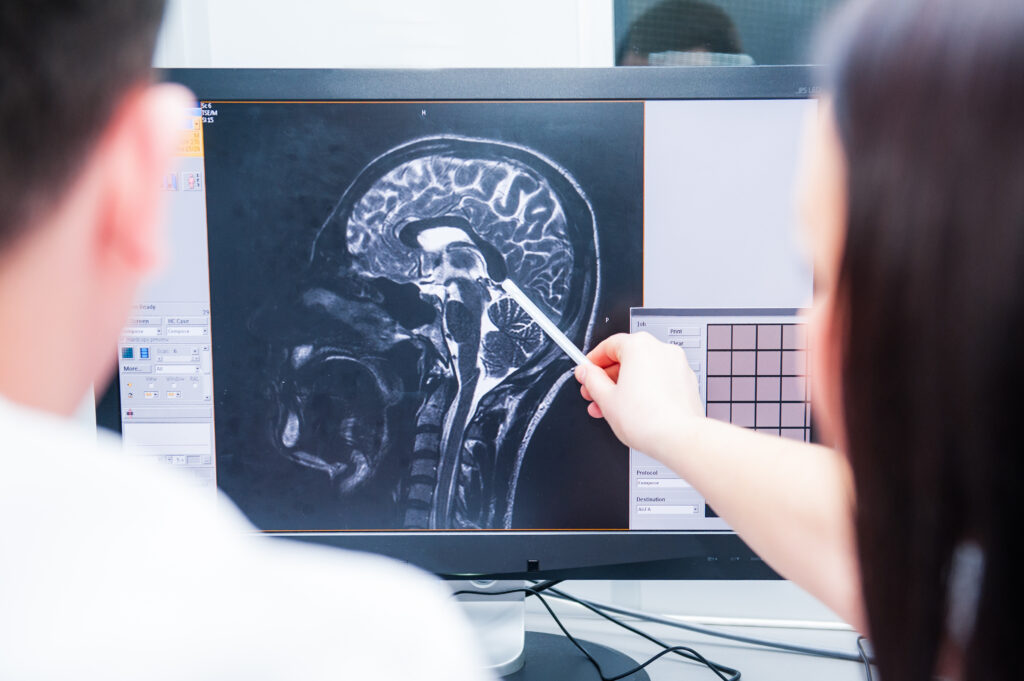
Serious car accidents cause a myriad of injuries: from broken glass and airbag burns, to flying debris and impairments from trying to brace yourself – if you have time to brace yourself. However, one of the scariest outcomes following an automobile crash is a brain injury. Also known as the “silent injury,” it is hard to know if the brain has been damaged after an accident. Life-threatening, in even just a mild form, this page specifically focuses on brain injuries caused by car wrecks.
If you’re reading this page, then you’re likely already aware if a severe brain injury has occurred. For more information on traumatic brain injuries, commonly referred to as TBIs, please see our brain injuries page.

If unsure of the severity of a recent injury, and you or someone you know has been in an accident that is either acting unusually or claiming to have a constant headache, medical attention should be sought after immediately. The brain is a sensitive organ, and when it suffers trauma without medical help (i.e. being pushed or banged into an object), it may swell, bleed, or cause irreversible damage. Should you suspect any of these conditions, go to the hospital right away.
After you have received medical attention for your brain injury, contact the attorneys at The Flood Law Firm by calling 860-346-2695 to find out how we may be able to help you move forward with your life. We offer a free, no-obligation case evaluation to determine your best options.
Motor Vehicle Accident Brain Injury
As outlined above, brain injuries do not always manifest immediately following an accident. In some cases, it is common for victims to walk away from the collision without feeling affected. Yet, even if there are no visible signs of bruising or bleeding, it’s imperative to have a doctor check for signs of a concussion or traumatic brain injury. Head injury statistics revealed:
- There were approximately 214,110 TBI-related hospitalizations in 2020.
- And 69,473 TBI-related deaths in 2021.
Without seeing a doctor, it’s possible to go days or even months without knowing you’ve suffered a TBI. Symptoms including migraines, fatigue, nausea, anxiety, and forgetfulness can often be the result of an untreated brain injury. A professional physician will know what signs to look for, and can officially diagnose you with a brain injury.
Types of Brain Injuries
You do not have to impact your head for a brain injury to take place. A closed head injury can result from your brain hitting the inside of your skull in a sudden or violent way. Due to the momentum that often takes place during an automobile wreck, the risk of experiencing a closed head injury is significant.
A “closed” traumatic brain injury refers to the invisible variety of a TBI, and occurs when the head injury is caused within the skull and offers no physical sign of harm.
For example, many motor vehicle-induced brain injuries result from whiplash, which takes place when the violent motion of the automobile causes you to pitch suddenly forward, and then back again. While whiplash is more commonly associated with back or neck pain, it may cause deeper health problems connected with a TBI, including post-concussive syndrome, cognitive malfunction, and emotional disorders.
In other cases, a TBI can be apparent, as in the case of an open traumatic brain injury. This type of TBI involves the skull being penetrated by a foreign object, exposing the brain itself. This is usually a direct result of a violent car crash where sharp fragments may cause serious wounds.
To learn more about brain injuries and symptoms, please visit our page on concussions.
Symptoms of a Brain Injury
As stated above the symptoms of a brain injury can vary from strange behavior to severe pain, difficulty balancing, visual impairment, or sensitivity to sound or light. However, these are not all of the symptoms and we have prepared this list of most common systems according to the Mayo Clinic:
Those who may have experienced a brain injury may suffer from:
Cognitive impairment: amnesia and forgetfulness, inability to speak or understand, mental confusion, difficulty concentrating, difficulty thinking and understanding, inability to create new memories, or inability to recognize common persons or objects
- Behavioral: abnormal laughing and crying, aggression, impulsivity, irritability, lack of restraint, or persistent repetition of words or actions
- Whole-body: balance disorder, blackout, dizziness, fainting, or fatigue
- Mood: anger, anxiety, apathy, or loneliness
- Eyes: dilated pupil(s), raccoon eyes, or unequal pupils
- Gastrointestinal: nausea or vomiting
- Sensory: sensitivity to light or sensitivity to sound
- Speech: slurred speech or impaired voice
Other common injuries after an impact to the head: persistent headache, a temporary moment of clarity, bleeding from the nose or ears, blurred vision, bone fracture, bruising, depression, loss of smell, nerve injury, post-traumatic seizure, ringing in the ears, or stiff muscles
While the list of injuries related to brain injury is extensive, any suspicion of an injury should be considered evidence enough to seek medical attention. Brain injuries can worsen and cause irreversible damage without medical treatment.
Recovering from Accident Induced Brain Injury
A “minor” car collision can still cause severe damage to your brain. Depending on the nature of the accident, you may be permitted to recover in bed, while some patients will need surgery. In severe cases, patients will have to remain in the hospital until the swelling or intracranial pressure goes down – which could take weeks. At a minimum, TBI patients could face:
- Physical therapy
- Frequent visits to the doctor
- Rehabilitation exercises and more
What You Should Do After a Car Accident
If you’ve suffered pain following a car crash, no matter how critical or not, you should see a doctor. You can specifically ask to be checked for a brain injury, as well as seek out a specialist.
After the accident, it is important for your health and your case to track your health symptoms. Many victims find it helpful to keep a journal where they can note their day-to-day condition. A journal may reveal a recurring pattern of symptoms that should not be ignored. Most importantly, if you notice a difference in how you feel compared to prior to the accident, return to the doctor for medical assistance.
How an Attorney Can Help Your Case
When it comes to your own health and wellness, you are your best advocate. However, an experienced car accident attorney can be a powerful voice on your behalf. Specifically, injury attorneys are able to connect you with medical experts who can give you the best diagnosis of your condition, as well as fight for you against insurance providers who may try to delay or deny coverage of your claim.
Working with the professional attorneys at The Flood Law Firm will give you the best possible support following your car accident in Connecticut. With years of combined experience, we can ensure a smooth and convenient process. From phone calls to medical records, we will take care of everything, allowing you to focus on what’s important: recovery. Furthermore, we never take a fee unless we are successful in securing compensation for the injuries you have suffered. Call us at (860)-346-2695 today for a no-cost, no-obligation consultation about your options.
